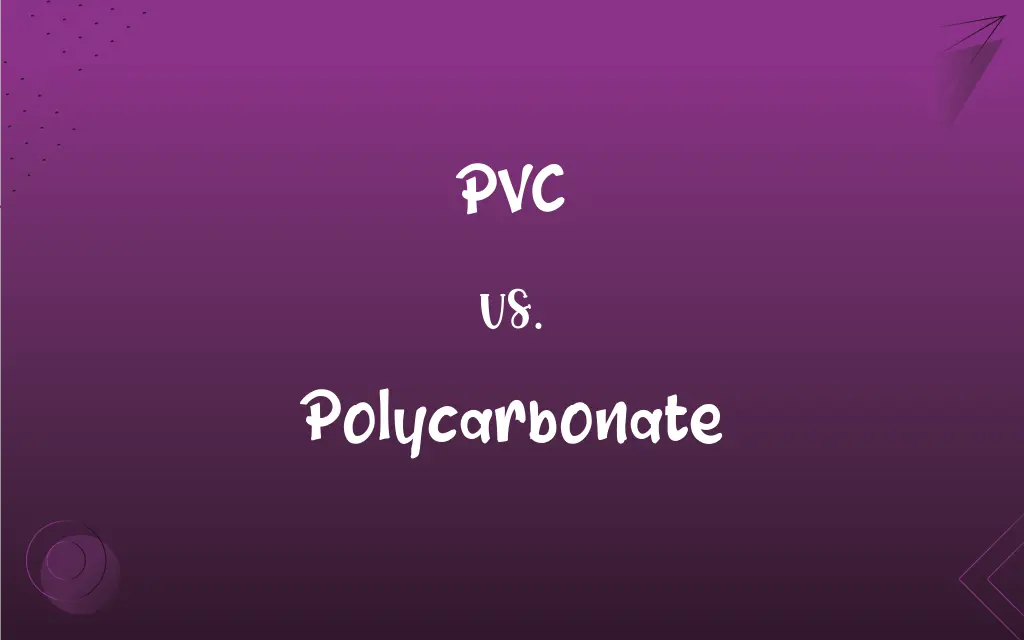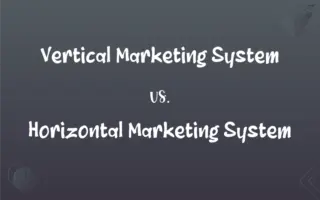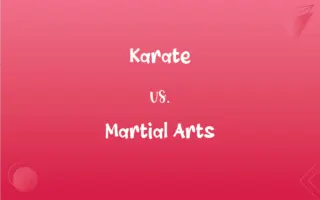PVC vs. Polycarbonate: What's the Difference?
Edited by Aimie Carlson || By Janet White || Published on January 1, 2024
PVC is a flexible, chlorine-containing plastic used in pipes and clothing, whereas polycarbonate is a tough, transparent plastic used in eyewear and CDs.

Key Differences
PVC, or polyvinyl chloride, is known for its durability and flexibility, commonly used in construction for pipes and home siding. Polycarbonate, on the other hand, is recognized for its high impact resistance and clarity, making it ideal for bulletproof glass and eyewear lenses.
PVC can be made softer and more flexible by adding plasticizers, which makes it suitable for applications like clothing and upholstery. In contrast, polycarbonate is naturally a rigid material, known for its ability to withstand extreme temperatures, used in applications like electronic components and heat-resistant containers.
In terms of environmental impact, PVC production and disposal raise concerns due to the release of toxic chlorine compounds. Polycarbonate, while more environmentally friendly in production, can release bisphenol A (BPA) under certain conditions, which has raised health concerns.
PVC is less expensive to produce compared to polycarbonate, making it a more cost-effective option for a wide range of applications. Polycarbonate, though more expensive, offers higher performance in terms of strength and clarity, justifying its higher cost in applications where these properties are crucial.
The application of PVC extends to everyday items like vinyl flooring and medical equipment due to its chemical resistance and ease of use. Polycarbonate finds its niche in more specialized applications like optical discs (CDs and DVDs) and riot shields due to its high impact resistance and optical clarity.
ADVERTISEMENT
Comparison Chart
Flexibility
Flexible with plasticizers
Naturally rigid
Common Uses
Pipes, clothing, flooring
Eyewear, bulletproof glass
Environmental Impact
Chlorine-related concerns
Concerns about BPA release
Cost
Generally less expensive
More expensive
Key Properties
Durability, chemical resistance
Impact resistance, temperature tolerance
ADVERTISEMENT
PVC and Polycarbonate Definitions
PVC
PVC is a versatile synthetic plastic polymer.
PVC pipes are commonly used in household plumbing.
Polycarbonate
Polycarbonate is a tough, transparent plastic.
Polycarbonate lenses are used in safety glasses.
PVC
PVC is known for its flexibility and durability.
Vinyl banners are often made of PVC for outdoor use.
Polycarbonate
Polycarbonate is used in applications requiring clarity and strength.
DVDs are made from polycarbonate due to its optical clarity.
PVC
PVC can be rigid or made flexible with additives.
Flexible PVC is used for making garden hoses.
Polycarbonate
Polycarbonate is known for its impact resistance.
Riot shields are often made of polycarbonate.
PVC
PVC stands for polyvinyl chloride, a type of plastic.
PVC insulation is commonly found in electrical wiring.
Polycarbonate
Polycarbonate is a type of thermoplastic polymer.
Polycarbonate roofing panels are used for their durability and transparency.
PVC
PVC is widely used in construction and clothing.
PVC siding is a popular choice for home exteriors.
Polycarbonate
Polycarbonate can withstand extreme temperatures.
Polycarbonate containers are popular for their heat resistance.
PVC
A polymer of vinyl chloride used instead of rubber in electric cables
Polycarbonate
Any of a group of thermoplastics that are linear polyesters of carbonic acid, especially those derived from bisphenol A and phosgene, characterized by high-impact strength, light weight, and flexibility, and used as shatter-resistant substitutes for glass.
PVC
Irregularity of cardiac rhythm; recurrent occurrences can be a precursor of ventricular fibrillation
Polycarbonate
(chemistry) Any of a range of polymers of aromatic carbonates; they are used to make light, flexible alternatives to glass. Abbreviation: PC
FAQs
What is polycarbonate used for?
Polycarbonate is used in eyewear, electronic components, and protective gear.
Does PVC contain BPA?
No, BPA is not a component of PVC.
How is PVC made?
It's made from the polymerization of vinyl chloride.
Is PVC environmentally friendly?
It raises concerns due to chlorine-related environmental impacts.
Is PVC safe for water pipes?
Yes, it's commonly used for potable water piping.
Does polycarbonate contain BPA?
Some types of polycarbonate can release BPA under certain conditions.
What is PVC used for?
PVC is used in construction, plumbing, and as a material for clothing and upholstery.
Can PVC be recycled?
Yes, but recycling PVC can be more complex due to its chlorine content.
Is polycarbonate good for outdoor use?
Yes, due to its UV resistance and durability.
Can polycarbonate block UV rays?
Yes, it's often used for UV protection.
Is polycarbonate stronger than PVC?
Yes, it's known for its high impact resistance.
Can polycarbonate be recycled?
Yes, polycarbonate can be recycled.
Can PVC be used for medical applications?
Yes, it's used in medical devices and tubing.
Is polycarbonate resistant to heat?
Yes, it has a high tolerance to heat.
Are polycarbonate products expensive?
They tend to be more expensive due to their high-performance properties.
How does PVC react to fire?
PVC can release toxic fumes when burned.
How is polycarbonate made?
It is produced through the reaction of bisphenol A and phosgene COCl2.
What are the disadvantages of polycarbonate?
Cost and concerns about BPA release are its main disadvantages.
Is PVC waterproof?
Yes, it is water-resistant.
Are PVC products affordable?
PVC is generally more affordable than polycarbonate.
About Author
Written by
Janet WhiteJanet White has been an esteemed writer and blogger for Difference Wiki. Holding a Master's degree in Science and Medical Journalism from the prestigious Boston University, she has consistently demonstrated her expertise and passion for her field. When she's not immersed in her work, Janet relishes her time exercising, delving into a good book, and cherishing moments with friends and family.
Edited by
Aimie CarlsonAimie Carlson, holding a master's degree in English literature, is a fervent English language enthusiast. She lends her writing talents to Difference Wiki, a prominent website that specializes in comparisons, offering readers insightful analyses that both captivate and inform.

































































